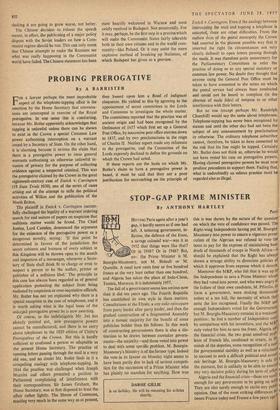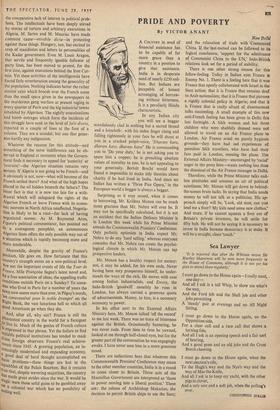STOP-GAP PRIME MINISTER
By ANTHONY HARTLEY PariS The fall of a government seems less serious now than it did ten years ago. The Fourth Republic has established its own style in these matters. Consultations at the Elysee, a coy nob o episco pare from party leader after party leader, and then the gradual construction of a fragmented Assembly into a mosaic majority for the benefit of some politician bolder than his fellows. In this work of constructing governments there is also a dis- tinction to be drawn between caretaker govern- ments—the majority—and those voted into power to deal with some specific problem. M. Boures- Maunoury's Ministry is of the former type. Indeed the vote in its favour on Monday night seems to have been partly due to lack of serious competi- tion for the succession of a Prime Minister who has plainly no mandate for anything. How true this is was shown by the nature of the question on which the vote of confidence was passed. The Right-wing Independents having put M. Bourges. Maunoury into power to ensure a vigorous prose, cution of the Algerian war refused to vote the taxes to pay for the expense of maintaining hum dreds of thousands of troops in North Africa—if should be explained that the Right has alwaY9 shown a strange ability to dissociate policies of which it approves from expense which it detests, Moreover the MRP, who felt that it was up tO the Independents to save a Prime Minister wholll they had voted into power, and who were angry at the failure of their own candidate, M. Pflimlin, ta form a government, were making threatening noises at a tax bill, the necessity of which 04 none the less recognised. Finally the MRP and enough Independents voted for the Government, but M. Bourges-Maunoury remains in a weakened position : he lost a number of Independent vote by comparison with his investiture, and the M only voted for him to save the franc. Algeria tul the financial crisis, the two great unsolved pre kms of French life, combined to create, in tile minds of the deputies, some recognition of a nee for governmental stability as well as a reluctance to succeed to such a difficult political and ecorio' mic heritage. M. Bourges-Maunoury is safe fo the moment, but is unlikely to be able to execui any very decisive policy during his term of 010: t Algeria and the financial crisis—these are surd enough for any government to be going on will! They are also surely enough to excite any pub14( opinion. One of the most striking differences be; tween France today and France a few years ago' 1 the comparative lack of interest in political prob- lems. The intellectuals have been deeply stirred by stories of torture and arbitrary executions in Algeria. M. Sartre and M. Mauriac have made common cause—mirabile dictu—in protesting against these things. Hungary, too, has excited its crop of manifestos and letters to personalities of the Kadar government. Even M. Louis Aragon, that servile and frequently ignoble follower of party lines, has been moved to protest, for the first time, against executions behind the Iron Cur- tain. Yet these activities of the intelligentsia have found little reverberation among the generality of ' the population. Nothing indicates better the rather I sinister calm which broods over the French scene than the small space given in the newspapers to the murderous gang warfare at present raging in , every quarter of Paris and the big industrial towns inhabited by Algerians. The nightly assassinations and bomb outrages which form the incidents of this struggle have sunk to the level of faits divers, reported in a couple of lines at the foot of a column. They are a scandal; but one that gener- ates hardly any indignation.
Whatever the reasons for this attitude—and something of the same indifference can be ob- served in England at moments when the Govern- ment finds it necessary to appeal for 'austerity' or 'restraine—the Algerian situation remains very serious. If Algeria is not going to be French—and it obviously is not, now—what will become of the French settled there? And what of the high hopes placed in the oil hidden beneath the Sahara? The bitter fact is that it is now too late for a with- drawal which will safeguard the rights of the Algerian French or leave France with its econo- mic interests in North Africa unaffected. Negotia- tion is likely to be a rout—for lack of having negotiated sooner. As M. Raymond Aron, rigaro's political commentator, has pointed out In a courageous pamphlet, an autonomous Algerian State offers the only possible way out of a situation which is rapidly becoming more and More intolerable.
Meanwhile, despite the gravity of France's Position, life goes on. How fortunate that this Country's strength exists on a non-political level. Are not the important events of life the Tour de Prance, Mlle Frangoise Sagan's latest novel and, by a free association of ideas, the appalling traffic Conditions outside Paris on a Sunday? To some- . ° ne who lived in Paris for a number of years the town now seems more than ever, in Pdguy's words, r • lat caravanserai pour le noble etranger' on the Itight Bank, the vast luxurious hell to which all good Americans go when they die.
And, after all, why not? France is still the Pleasantest country in the world for a foreigner 0.0 live in. Much of the genius of French culture is expressed in that phrase. Yet the failure to find political institutions has tended to mask ireill foreign observers France's real achieve- Ments since 1945. A- growing population, an in- creasingly modernised and expanding economy, ,a good deal of hard thought accomplished on °IaSie problems—these things are lost in the squabbles of the Palais Bourbon. But it remains !rue that, despite wavering majorities, the country !las made great strides since the war. It would be _tragic were those solid gains to be gambled away un a colonial war which has no possibility of ending well.



































 Previous page
Previous page